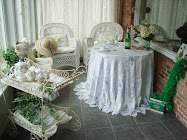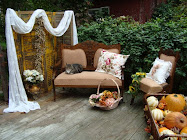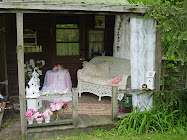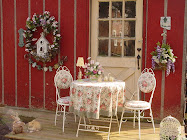 One never opened an umbrella in the house, or walked under a ladder. That was bad luck. And no superstitious Victorian would even think of cutting his or her fingernails on Friday. For Friday was considered an evil day.
One never opened an umbrella in the house, or walked under a ladder. That was bad luck. And no superstitious Victorian would even think of cutting his or her fingernails on Friday. For Friday was considered an evil day.When Victorians entered the house for the first time, it was with the right foot forward, and if perchance they were fortunate enough to be well dressed when they entered a new home, good luck was assured.
Men avoided the left side of the street and women worried about breaking a looking-glass. More bad luck.

Deep inside, the Victorians knew that their superstitions were contrary to common sense, but they still had a healthy respect for them. Why tempt the fates?
Men as well as women had their favorite superstitions. Some were handed down from generation to generation, others were offered by ladies’ magazines. They touched upon almost every aspect of daily life.
Take the ordinary broom, for instance. It was never to be loaned to anyone, not even a friend. That was bad luck. And if a family changed residences, they were not to leave the broom behind, not even if it was old. When buying a broom they were to avoid the month of May because~
”Brooms bought in May,
Sweep the family away”
It was bad luck to step over a broom, but good luck to accidentally walk under one. (The ladies’ magazine did not explain how one happened to walk under a broom, even accidentally. Presumably, the Victorians knew.)
Even the lowly dish towel has superstitions associated with it. If it was lost, that was equivalent to finding another home, and it was especially unlucky to touch another person with a dish cloth. The accidental burning of a towel was the forerunner of sickness, while trouble lay ahead for those who burned green vegetables or bread. No doubt these were superstitions that the cook and the scullery maid were careful to respect. And you can be sure, the mistress of the house made certain that they were aware of them.
 The salt cellar afforded innumerable signs of coming fortune. Good luck demanded that it should always be clean and well filled. Salt was not to be borrowed or lent. This was bad luck. The salt box itself was never to be allowed to get entirely empty and before using salt from a fresh box, some of it had to be burned. Burning the salt could accomplish more that just ensuring good luck. Repeating the name of someone you liked while it was burning could get them to think of you. An old salt box, like an old broom, was not to be given away or left for others to use.
The salt cellar afforded innumerable signs of coming fortune. Good luck demanded that it should always be clean and well filled. Salt was not to be borrowed or lent. This was bad luck. The salt box itself was never to be allowed to get entirely empty and before using salt from a fresh box, some of it had to be burned. Burning the salt could accomplish more that just ensuring good luck. Repeating the name of someone you liked while it was burning could get them to think of you. An old salt box, like an old broom, was not to be given away or left for others to use.
An evil sign to be avoided at all costs was the spilling of salt. If it was spilled on a Friday, it was bad luck and nothing could be done about it, since Friday was an unlucky day. On any other day of the week, however, the bad luck could be neutralized by throwing the spilled salt over your left shoulder. (Sound familiar?)
Men as well as women had their favorite superstitions. Some were handed down from generation to generation, others were offered by ladies’ magazines. They touched upon almost every aspect of daily life.

Take the ordinary broom, for instance. It was never to be loaned to anyone, not even a friend. That was bad luck. And if a family changed residences, they were not to leave the broom behind, not even if it was old. When buying a broom they were to avoid the month of May because~
”Brooms bought in May,
Sweep the family away”
It was bad luck to step over a broom, but good luck to accidentally walk under one. (The ladies’ magazine did not explain how one happened to walk under a broom, even accidentally. Presumably, the Victorians knew.)
Even the lowly dish towel has superstitions associated with it. If it was lost, that was equivalent to finding another home, and it was especially unlucky to touch another person with a dish cloth. The accidental burning of a towel was the forerunner of sickness, while trouble lay ahead for those who burned green vegetables or bread. No doubt these were superstitions that the cook and the scullery maid were careful to respect. And you can be sure, the mistress of the house made certain that they were aware of them.
 The salt cellar afforded innumerable signs of coming fortune. Good luck demanded that it should always be clean and well filled. Salt was not to be borrowed or lent. This was bad luck. The salt box itself was never to be allowed to get entirely empty and before using salt from a fresh box, some of it had to be burned. Burning the salt could accomplish more that just ensuring good luck. Repeating the name of someone you liked while it was burning could get them to think of you. An old salt box, like an old broom, was not to be given away or left for others to use.
The salt cellar afforded innumerable signs of coming fortune. Good luck demanded that it should always be clean and well filled. Salt was not to be borrowed or lent. This was bad luck. The salt box itself was never to be allowed to get entirely empty and before using salt from a fresh box, some of it had to be burned. Burning the salt could accomplish more that just ensuring good luck. Repeating the name of someone you liked while it was burning could get them to think of you. An old salt box, like an old broom, was not to be given away or left for others to use.An evil sign to be avoided at all costs was the spilling of salt. If it was spilled on a Friday, it was bad luck and nothing could be done about it, since Friday was an unlucky day. On any other day of the week, however, the bad luck could be neutralized by throwing the spilled salt over your left shoulder. (Sound familiar?)
Do you remember some of these old "wives tales"? I sure do!!
Don't forget the 20% off sale at Aunt May's Cottage!!














